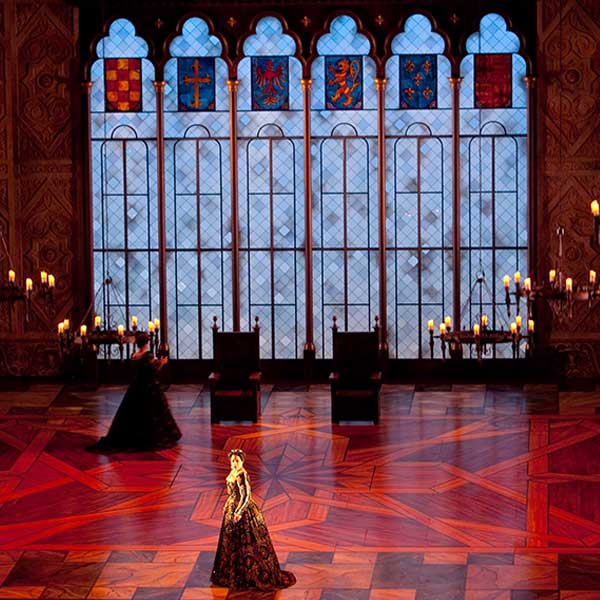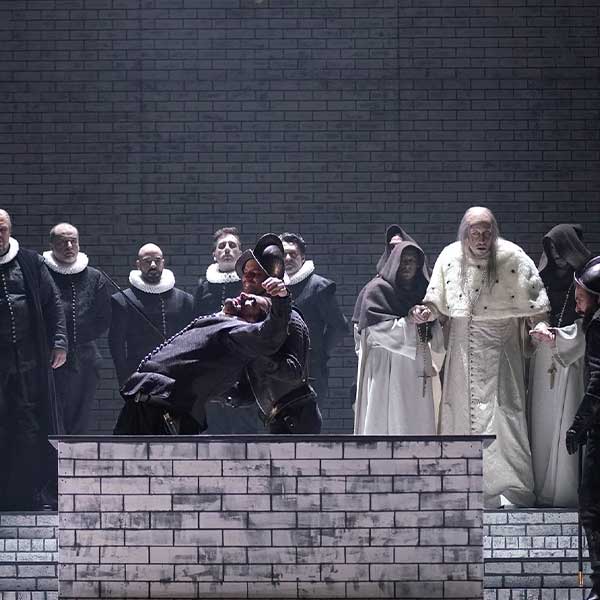January 28, 2022
The genius of Giuseppe Verdi’s lesser known gems
Giuseppe Verdi is widely considered one of the greatest composers of the 19th century. His works were not set in the world of myth and legend, instead they looked at the lives of real — or at least realistic — people and situations. Throughout his long career, he looked to literature for inspiration and found great success adapting works by Shakespeare and Schiller. Social commentary was a major aspect of Verdi's work and his political leanings are easy to decipher even today. In Italy, he skirted the state censorship of the theater by setting his operas in other lands and eras. Audiences, however, were not fooled; turning some of his most famous works into rallying cries and rocketing him to superstardom. Throughout his career, Verdi's sound evolved from early bel canto operas influenced by predecessors like Donizetti and Bellini to through-composed verismo works that were a sound all his own.
From the rousing choruses of Nabucco to the complex characters of La traviata, there's much more to this celebrated composer than his greatest hits. In this blog, we'll take a look at ten of Verdi's lesser known gems.
Oberto
The best place to start is at the beginning. While it was far from an instant success, Verdi's first opera Oberto managed to secure the 26-year-old composer a contract for three more works at Milan's famed La Scala. Set in the 13th century, the two-act opera centers around two feuding families. Even in this early work, you can already hear hints of the powerhouse choruses and ensemble performances that would make Verdi a household name. If you only listen to one selection, it should be the Act One quartet, "A quell' aspetto" ("In his presence") in which Oberto sings of his hatred for the man who jilted his daughter, while Riccardo begrudgingly agrees to duel the aging Oberto, Leonora supports her father, and Cuniza's feelings toward her former finance turn to disdain.
Ernani
Ernani's 1844 premiere took Venice by storm and remained Verdi's most popular opera until Il trovatore nearly a decade later. The piece also has the distinction of being the first complete recording of an opera — made on 40 single-sided discs — by the Gramophone Company (later EMI) in 1904. This opera features a love quadrangle, hidden identities, and more morally gray characters than you can count. Just when you think everyone is going to have a happy ending, Verdi throws in a major twist. In a grand finale, the Act Four trio, "Ferma, crudele" ("Cease, cruelty") sees Ernani and Elvira forced to face the music when Silva comes to claim his debt.
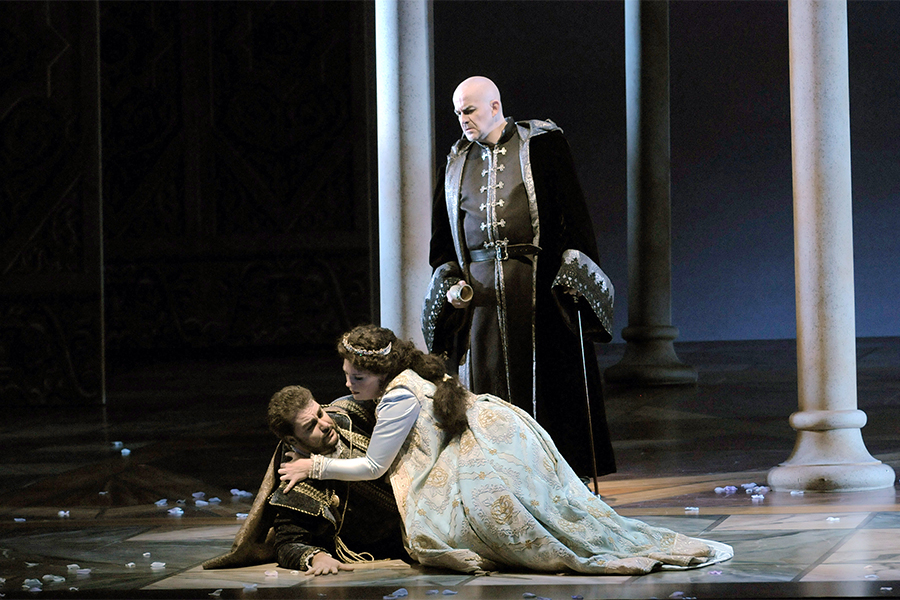
Salvatore Licitra (Ernani), Sondra Radvanovsky (Elvira), and Giacomo Prestia (Don Ruy Gomez de Silva) in Ernani, 2009/10.
I due Foscari
Verdi's I due Foscari (The two Foscari) premiered to general acclaim on November 3, 1844 — just a few months after the premiere of Ernani. The opera is based on a play by Lord Byron; however, Verdi and his librettist Francesco Maria Piave were worried that the intimate scenes and real-life drama of 15th-century Doge, Francesco Foscari, and his son were not grand enough to suit the scale of the operatic stage. The council chamber scenes offer classic Verdian ensembles, but the true highlight is the Act Two duet, "No, non morrai" ("No, you won't die") between Jacopo and his wife. One of the opera's most tender moments, we see Lucrezia comforting her husband who is in prison following his murder trial. In this duet, she promises to follow Jacopo into exile, because being separated again would be a fate worse than death.
Un ballo in maschera
Verdi's 1859 opera, Un ballo in maschera (A masked ball) went through numerous revisions before becoming the opera we know today. Originally set in 18th-century Sweden, it was based on real events surrounding the assasination of King Gustav III. Italian sensors — aghast at the prospect of onstage regicide — demanded multiple changes to the characters and plot. Instead, Verdi simply chose to move the entire story to Boston, Massachusetts during the colonial era. It wasn't until the mid 20th-century that the Swedish setting was restored. The moment that turns the tide in this opera is the rapturous love duet, "Teco io sto," where Riccardo and Elvira finally voice their forbidden love for each other.
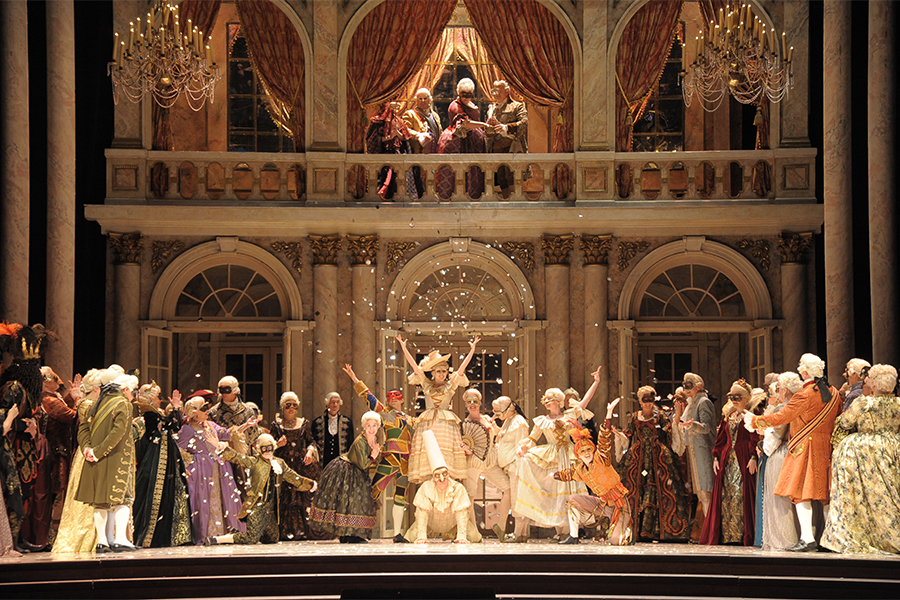
Act Three of Lyric's 2010/11 production of A masked ball.
La forza del destino
Most theater fans know of the superstition surrounding Shakespeare's Macbeth, but did you know that Verdi's La forza del destino (The force of destiny) has acquired a reputation in the opera world for being cursed? Following a three year hiatus from music, Verdi returned to the stage with this piece in 1862. Even though the opera centers around three main characters (Alvaro, Carlo, and Leonora), their fondness for hidden identities leads to a rather confusing plot. Storyline aside, Verdi's music is undeniably beautiful. A favorite among sopranos, the final scene opens with Leonora's aria "Pace, pace, mio dio" ("Peace, my lord") in which she confesses her love for Alvaro despite his apparent betrayal and begs God for peace.
Simon Boccanegra
Although Simon Boccanegra first premiered in 1857, Verdi returned to the opera nearly 25 years later, replacing the original libretto by Francesco Piave with new texts by Arrigo Boito. One of the biggest changes was the addition of the dramatic Council Chamber scene, which the older Verdi filled to the brim with powerhouse ensembles. From murky moral compasses and touching father-daughter moments, it's easy to draw parallels between the dynamic title character of this opera and another complex Verdi baritone role, Rigoletto. One of the opera's pivotal moments happens early in Act One when Boccanegra realizes that Amelia is his long-lost daughter. In "Orfanelle il tetto umile...Figlia! a tal nome io palpito" they sing, joyous over the reunion.
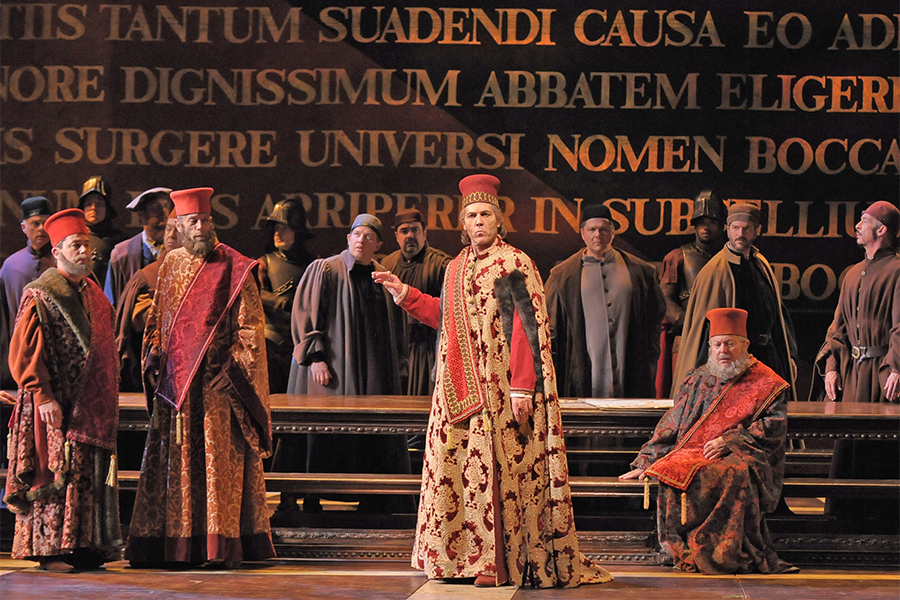
Thomas Hampson in the title role of Simon Boccanegra, 2012/13.
I vespri siciliani
Hot on the heels of three of his biggest hits — Rigoletto, Il Trovatore, and La traviata — Verdi produced I vespri siciliani (originally Les vêpres siciliennes) for the Paris Opera. While the opera was a hit in France, the topic of revolution in Sicily was off limits in Verdi's homeland until Italy's unification in 1861. This opera boasts one of the highest body counts in the repertoire with nearly all of the main characters meeting their demise by the time the curtain falls. One of the most spectacular moments is the plaintive Act Four tenor aria "Giorno di Pianto" ("Day of weeping, of fierce sorrow!"), where Arrigo is caught in the crossfire between his revolutionary friends and his newly discovered father, the Governor.
Don Carlos
Over the course of 20 years, Verdi went through seven different versions of Don Carlos, but after all that work, it's easy to see why it is still considered one of his greatest masterpieces. Loosely based on historical figures, the opera takes place during the Spanish Inquisition. From Carlos's fiery interactions with his father Phillipe, to endearing friendship duets with Rodrigue, and the "will they, won't they'' love songs with his step-mother Elizabeth, Verdi gave all six main characters wonderful music. One moment that really steals the spotlight, however, comes in the middle of Act Four when the King's mistress, Eboli, delivers her powerful aria "O don fatale," in which she curses her ego, and resolves to make things right with the Queen by saving Carlos from the Grand Inquisitor.
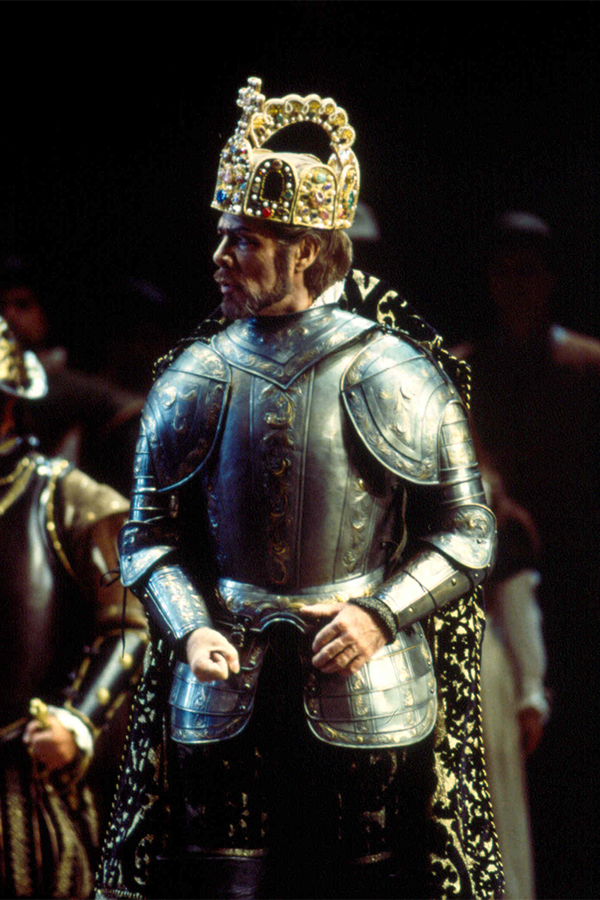
Samuel Ramey as Philip II in Don Carlo, 1996/97.
Stiffelio
Immediately preceding three of Verdi's biggest hits, Stiffelo has never been quite as popular. Censors of the time preferred to keep religion out of the opera house, and this work put it center stage. It tells the story of a Protestant minister who discovers his wife having an affair. There's murder, intrigue, and, ultimately, forgiveness. By moving away from stories of grand courtiers to everyday people, the drama feels intrinsically relatable. Over the years, the opera was altered and diluted until little of Verdi's vision remained. It wasn't until 1993 — when The Metropolitan Opera performed the newly unearthed original version — that Verdi's full intended story played out onstage. The Act Three aria, "Lina, pensai che un angelo" (Lina, I thought heaven had given me an angel") showcases the kind of complex father-daughter relationship that made Verdi famous. In it, Stanker wonders over his beloved daughter's infidelity and the repercussions their family will face.
Luisa Miller
With 14 works already under his belt, Verdi's 1849 opera Luisa Miller is often credited as the start of the composer's "middle period." Verdi loved a good love triangle and found the perfect inspiration in a play by Schiller. It had everything: love, intrigue...and poison. One of the most popular arias from this piece has to be Rodolfo's Act Three aria, "Quando le sere al placido." In this scene, the heartbroken tenor reflects on quiet evenings spent with Luisa, wondering if their love was all a lie.
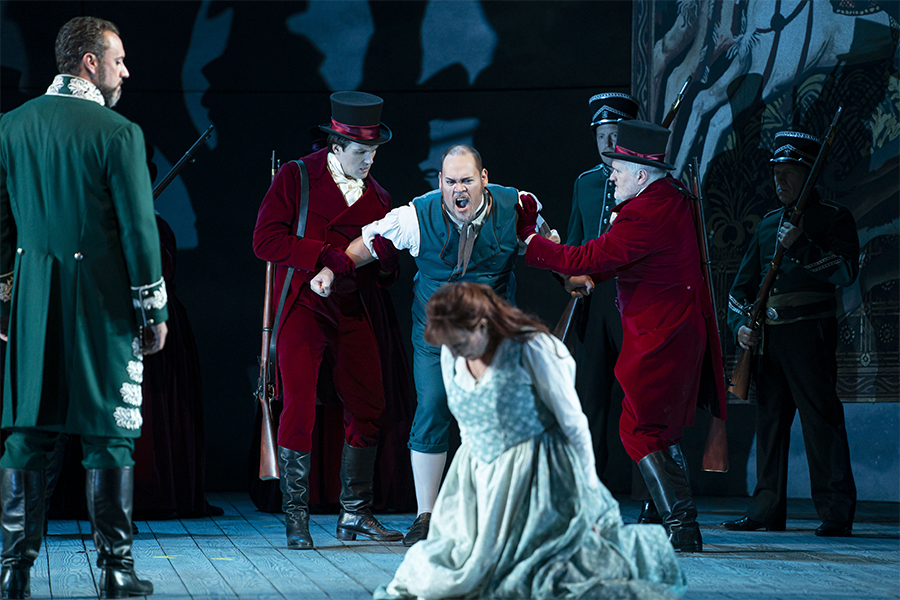
Christian Van Horn (Walter), Krassimira Stoyanova (Luisa Miller), and Quinn Kelsey (Miller) in Luisa Miller, 2019/20.
For even more great music, explore the full playlist of Verdi gems on Spotify:
September 9 - October 1, 2022
Ernani
Ernani
The 2022/23 Season opens with a thrilling continuation of Lyric's acclaimed early Verdi series. Ernani reveals Verdi at his most irresistibly melodic and dramatic. A persecuted nobleman forced to disguise himself as an outlaw, Ernani loves beautiful Elvira, but she's pursued by two other men — her uncle, Silva, and the King of Spain, Carlo. This "love quadrangle" inspires grand-scale arias and ensembles, bursting with the unique energy and drive that were Verdi's own. Music Director Enrique Mazzola leads a quartet of world-renowned Verdians in Lyric's sumptuously beautiful production that is designed to bring you an exhilarating operatic experience.
Acknowledged by audiences and critics alike as one of the most magnificent achievements in the history of opera, Don Carlos masterfully reveals the private turmoil of very public personalities. In 16th-century Spain, King Philip II is torn apart by his own jealous suspicions that his son, crown prince Carlos, and Queen Elisabeth — Philip’s young wife and Carlos’s stepmother — are in love. The drama unfolds and washes over you with unforgettable intensity and thrilling musical splendor. The full stature of this epic opera will be revealed at Lyric as never before when performed in the full five acts, with the matchless eloquence of the opera’s original French text. Don Carlos is a tour-de-force experience for those who love Verdi in his prime.
Acknowledged by audiences and critics alike as one of the most magnificent achievements in the history of opera, Don Carlos masterfully reveals the private turmoil of very public personalities. In 16th-century Spain, King Philip II is torn apart by his own jealous suspicions that his son, crown prince Carlos, and Queen Elisabeth — Philip’s young wife and Carlos’s stepmother — are in love. The drama unfolds and washes over you with unforgettable intensity and thrilling musical splendor. The full stature of this epic opera will be revealed at Lyric as never before when performed in the full five acts, with the matchless eloquence of the opera’s original French text. Don Carlos is a tour-de-force experience for those who love Verdi in his prime.
November 9 - November 25, 2022
Don Carlos
Don Carlos
Acknowledged by audiences and critics alike as one of the most magnificent achievements in the history of opera, Don Carlos masterfully reveals the private turmoil of very public personalities. In 16th-century Spain, King Philip II is torn apart by his own jealous suspicions that his son, crown prince Carlos, and Queen Elisabeth — Philip’s young wife and Carlos’s stepmother — are in love. The drama unfolds and washes over you with unforgettable intensity and thrilling musical splendor. The full stature of this epic opera will be revealed at Lyric as never before when performed in the full five acts, with the matchless eloquence of the opera’s original French text. Don Carlos is a tour-de-force experience for those who love Verdi in his prime.

